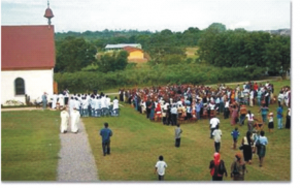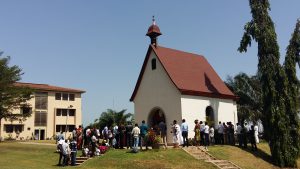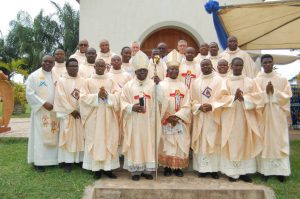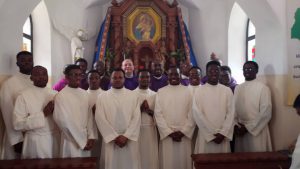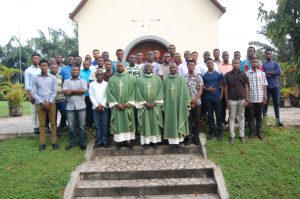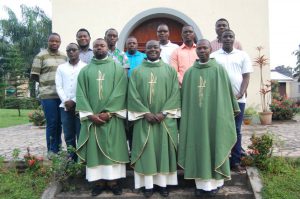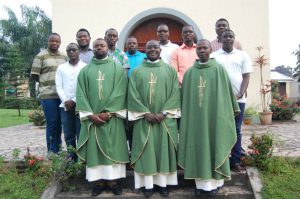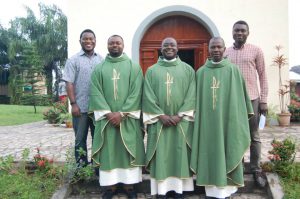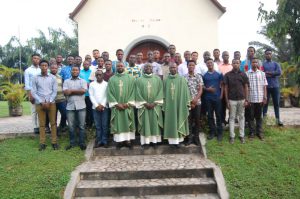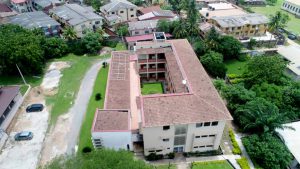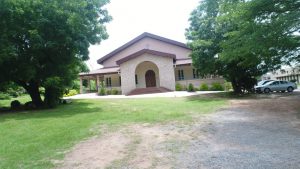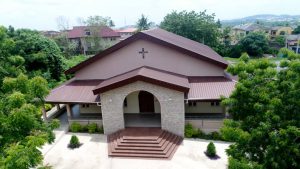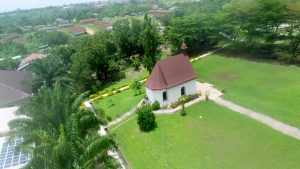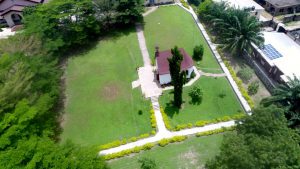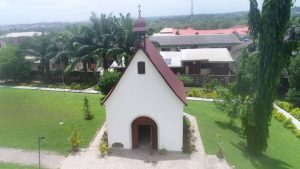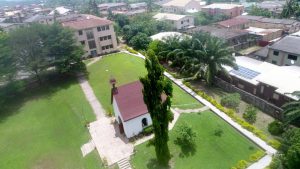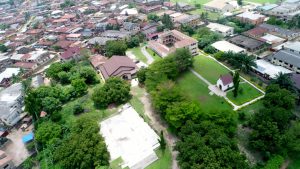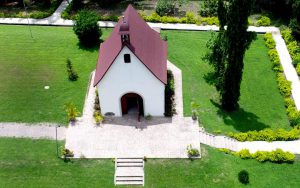Library Information
Our Library is well structured to provide with ease materials and resources needed for academic success and pastoral fruitfulness.
- Students-24hours
- Formators-24hours
- Others-9am-4pm
THE LIBRARY BUILDING, FURNITURE AND EQUIPMENT
The library is housed at the first floor of the main building. It is about the size of a classroom and can seat about 20 users at a time. The furniture is tailor made and include reading tables, reading chairs, reading wall platforms, librarian’s desk and five double-sided shelves and periodicals boxes. Five computers connected to the Internet have been deployed in the library. While one serves as the server, the four others are for users’ information search, access, and use.
Though the size of the library is relatively small, it has been networked such that users can access the information resources anytime from anywhere in the environment. The library is highly illuminated and ventilated both naturally and with air conditioners. The fathers and the student brothers can also access the library Wi-Fi from the comfort of their rooms.
THE LIBRARY COLLECTION
The library has a physical collection size of about six thousand volumes consisting of textbooks, dictionaries, encyclopaedias, compendiums, theses and dissertations and literary ephemerals, especially pamphlets. The collection covers mainly philosophy, theology, psychology, and the humanities which are the core disciplines the Schoenstatt Fathers and Brothers are concerned with either as formators or students. The collection is largely in English but has a significant quantity in Modern European languages especially German, Italian, and French. Substantial translations have been made of the collections in foreign languages for the purpose of catalogue records. This is courtesy of the present Rector, Rev. Fr. Dr. Charles Ozioko, ISch. An especially important focus on the collection consists of the contributions of Fr. Joseph Kentenich, the Founder of the International Marian Apostolic Movement of Renewal of Schoenstatt. The collection is quite comprehensive and spans a variety of remarkably interesting topics in philosophy and theology. The library also has a good collection of Papal encyclicals and publications on the Blessed Virgin Mary.
The library collection is greatly boosted by the application of Information and Communication Technologies (ICTs). The LABRINKA software has been used to create an online database linked to some important databases in the humanities and social sciences via the Internet.
UNIFORM TITLES IN THE CATALOGUE
For ease of retrieval, uniform titles have been created for some of the key library materials. This has created artificial uniform titles in the catalogue. For example, all the publications of the Founder, Fr. Joseph Kentenich in the collection, no matter the subject, no matter the title, have been brought together under a uniform title, [KENTENICH]. However, each of the publications maintains its unique class number to show the actual subject it has treated. Though the publications could be placed at various locations on the bookshelves, those in form of pamphlets have been kept together in periodicals boxes for users’ convenience. Other uniform titles in the catalogue include [MARY]and [PAPAL ENCYCLICALS]
ORGANISATION OF THE COLLECTION
The collection has been organised using the Dewey Decimal Classification (DDC) system. Founded in 1876 by an American librarian, Melvil Dewey, the DDC has organised the universe of knowledge into ten broad classes: 001-999. The DDC is favoured for organising relatively small library collections especially because of its cost effectiveness. It is also pneumonic as it uses Arabic numerals and decimals as class symbols, and these can easily be remembered by the user moving from the computerised catalogue to the shelf in time of information search and retrieval.
SUMMARY OF THE DDC CLASSES
The broad classes are:
100-199 – Philosophy and related disciplines
200-299 – Religion
300-399 – Social Sciences
400-499 – Languages
500-599 – Pure Sciences
600-699 – Applied Sciences (Technology)
700-799 – The Arts (including sports, painting, and architecture)
800-899 – Literature
900-999 – Geography, History, Biography
For retrieving a material from the shelves, the user needs to either know the full class number or class group, for example, 200 for any material on religion. However, it is advisable to pass through the library catalogue for expedient information retrieval.
THE LIBRARY CATALOGUE: Organisation and use
The catalogue is an important information discovery tool in the library. It shows at a glance:
- What books and other information materials are available in the library
- What the library has by a particular author
- What the library has on a given title
- What the library has on a particular subject (this could be specific, for example, Ecumenism, Fr. Kentenich, morality and epistemology)
- What the library has in a given publication series
Any library user approaching the catalogue ought to have, at least, one of the clues in mind. All entries in the catalogue are arranged in alphabetical order for ease of retrieval. Once a needed item is retrieved in the catalogue, the user should copy the call number with which it will be traced on the bookshelves. The shelves are well labelled according to class groups to guide the user. The Schoenstatt Library catalogue is computerized and so is easy to search.






A small river named Duden flows by their place and supplies it with the necessary regelialia. It is a paradisematic country, in which

A small river named Duden flows by their place and supplies it with the necessary regelialia. It is a paradisematic country, in which

A small river named Duden flows by their place and supplies it with the necessary regelialia. It is a paradisematic country, in which


